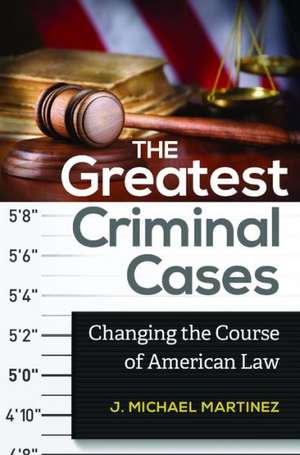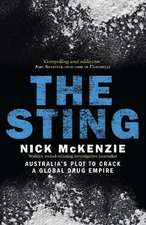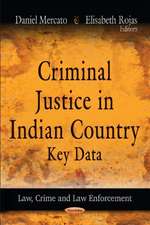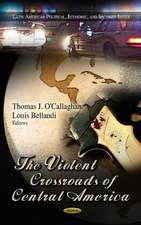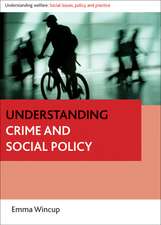The Greatest Criminal Cases: Changing the Course of American Law
Autor J. Michael Martinezen Limba Engleză Hardback – 27 mar 2014 – vârsta până la 17 ani
Preț: 324.38 lei
Preț vechi: 482.91 lei
-33% Nou
Puncte Express: 487
Preț estimativ în valută:
62.08€ • 63.57$ • 51.64£
62.08€ • 63.57$ • 51.64£
Carte tipărită la comandă
Livrare economică 18 martie-01 aprilie
Preluare comenzi: 021 569.72.76
Specificații
ISBN-13: 9781440828683
ISBN-10: 1440828687
Pagini: 288
Ilustrații: 20 bw illus
Dimensiuni: 156 x 235 x 28 mm
Greutate: 0.64 kg
Ediția:New.
Editura: Bloomsbury Publishing
Colecția Praeger
Locul publicării:New York, United States
ISBN-10: 1440828687
Pagini: 288
Ilustrații: 20 bw illus
Dimensiuni: 156 x 235 x 28 mm
Greutate: 0.64 kg
Ediția:New.
Editura: Bloomsbury Publishing
Colecția Praeger
Locul publicării:New York, United States
Caracteristici
Connects the importance of the cases to constitutional criminal procedure
Notă biografică
J. Michael Martinez, PhD, teaches political science, criminal justice, and public administration courses at Kennesaw State University, the University of South Dakota (online), and the University of Georgia, respectively.
Cuprins
Introduction and AcknowledgmentsChapter 1 Hurtado v. California (1884) and 19th-Century Criminal ProcedureChapter 2 Weeks v. United States (1914) and the Origins of the Exclusionary RuleChapter 3 Olmstead v. United States (1928) and Wiretapping the "Baby Lieutenant"Chapter 4 Powell v. Alabama (1932) and the Scottsboro BoysChapter 5 Brown v. Mississippi (1936) and Fundamental FairnessChapter 6 Mapp v. Ohio (1961) and the Exclusionary Rule ReduxChapter 7 Gideon v. Wainwright (1963) and the Right to CounselChapter 8 Miranda v. Arizona (1966) and the Right to Remain SilentChapter 9 Katz v. United States (1967) and the Right to PrivacyChapter 10 Terry v. Ohio (1968) and the Stop-and-Frisk SearchChapter 11 Chimel v. California (1969) and Searches Incident to ArrestChapter 12 United States v. Leon (1984) and a Good Faith Exception to the Exclusionary RuleChapter 13 California v. Hodari D. (1991) and Determining When a "Seizure" OccursChapter 14 Hamdan v. Rumsfeld (2006) and Trial by JuryConclusionBibliographyIndex
